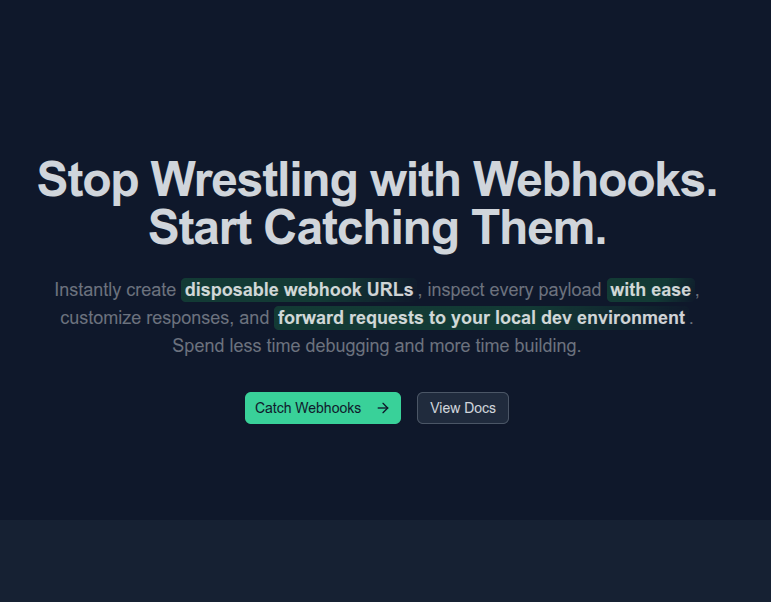Product Introduction
- Webhook Catcher is a developer tool that provides instant disposable webhook endpoints for testing, debugging, and inspecting HTTP payloads. It enables users to generate unique URLs, analyze request details in real-time, customize responses, and securely forward webhooks to local development environments or external services. The platform operates through a web interface without requiring installations or account creation.
- The core value lies in streamlining webhook-related workflows by eliminating manual server setup and providing centralized tools for payload analysis. It reduces debugging time through instant request visualization, offers flexibility in testing scenarios via response customization, and bridges production-to-local environment communication gaps through secure request forwarding capabilities.
Main Features
- Instant webhook endpoint creation generates unique URLs within seconds through a single click, supporting temporary endpoints for specific testing sessions without persistent storage requirements. These endpoints accept POST, GET, and custom HTTP methods while automatically logging all incoming requests with timestamp metadata.
- Real-time request inspection displays complete HTTP transaction details including headers, query parameters, and body content with syntax highlighting for JSON/XML formats. Users can filter requests by status codes, search payload contents, and view response times down to millisecond precision through an interactive dashboard.
- Localhost forwarding establishes secure tunnels using HTTPS-to-HTTP proxies that maintain header integrity while allowing payload modification through regex-based transformation rules. This feature supports custom HTTP methods, header injection, and retry mechanisms for unreliable network conditions during development testing.
Problems Solved
- Eliminates the need for developers to manually create and maintain temporary servers for webhook testing during third-party API integrations. Traditional methods requiring ngrok setups or cloud deployment are replaced with browser-accessible endpoints that persist only for active debugging sessions.
- Primarily serves backend developers, API engineers, and QA teams working with payment gateways, IoT device integrations, and SaaS platform webhook implementations. Secondary users include technical support teams analyzing production webhook failures through historical request logs.
- Typical scenarios include debugging Stripe payment event discrepancies, verifying GitHub webhook payload structures during CI/CD setup, and testing Twilio SMS callback integrations without exposing local development environments to public internet access requirements.
Unique Advantages
- Combines request inspection, endpoint management, and local forwarding in a unified interface unlike competitors offering singular functionalities. The platform integrates features typically requiring multiple separate tools (Postman, ngrok, and internal logging systems) into a cohesive workflow.
- Offers an embedded webhook playground with preconfigured cURL templates, dynamic payload variables, and response simulation for 400/500 HTTP status codes. Users can test edge cases like delayed responses or large payloads (>1MB) through configurable stress-test parameters.
- Operates without mandatory user accounts while maintaining session persistence through browser-local storage encryption. The architecture guarantees zero data retention beyond active sessions unless explicitly exported, complying with GDPR standards through automatic 24-hour request log purges.
Frequently Asked Questions (FAQ)
- How does Webhook Catcher ensure security for forwarded requests to localhost? All local tunneling uses AES-256 encrypted SSH connections with auto-rotating keys, maintaining end-to-end encryption without storing decrypted payloads. Forwarding rules require explicit user confirmation for each target URL to prevent accidental exposure.
- Can I use custom domains for webhook endpoints? The current version provides *.webhook.projext.in subdomains exclusively, with enterprise plans offering CNAME customization through scheduled DNS verification and LetsEncrypt SSL certificate automation.
- What happens to my data after session expiration? All request logs and endpoint configurations are permanently deleted 24 hours after last activity, though users can manually export JSON-formatted logs containing headers, bodies, and response metadata for indefinite storage.
- Is there an API for automated webhook testing? A REST API with JWT authentication is available for programmatic endpoint creation and log retrieval, supporting webhook simulation through POST /api/v1/endpoints/{id}/trigger with custom payloads and headers.
- How does the request transformation work during forwarding? Users can apply JavaScript-based middleware to modify payloads using a secure sandboxed environment, enabling field renaming, value encryption, or format conversion (XML to JSON) before retransmitting requests to target URLs.
